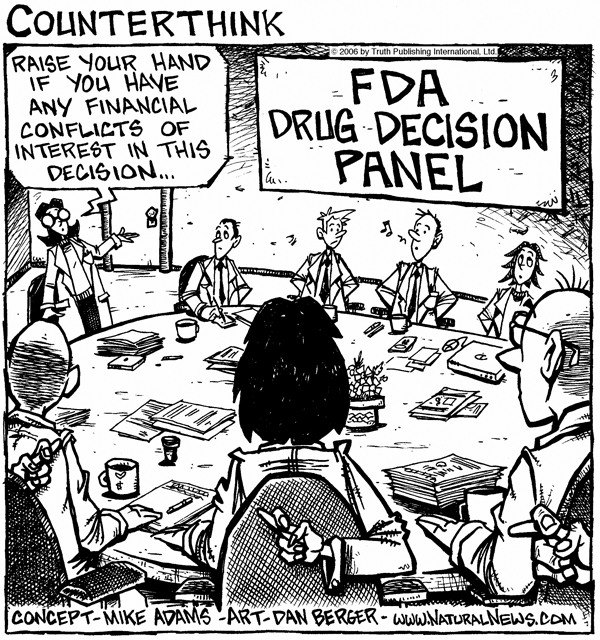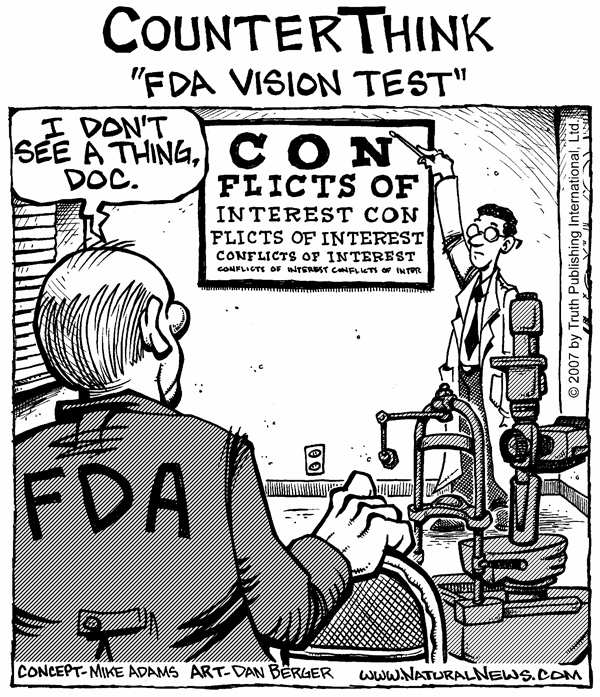Americans Fed up with Drug Industry Influence and FDA Corruption
By Mike
Adams, Natural News Editor
More than four out of five Americans think drug companies have
too much influence over the Food and Drug Administration, and 84 percent believe
that advertisements for prescription drugs with safety concerns should be
outlawed, reveals a striking new survey from Consumer Reports.
The survey results, released today, are based on a telephone survey of 1,026 American adults conducted by the Consumer Reports National Research Center. They reveal the Food and Drug Administration to be alarmingly out of touch with the concerns of the American people. Some of the most interesting results include:
• 96 percent agreed the government should have the power to require warning labels on drugs with known safety problems. As Consumer Reports explains, "Right now, the Food and Drug Administration must negotiate safety warning labels with a drug maker."
• 84 percent agree that drug companies have "too much influence over the government officials who regulate them." More than two-thirds of those surveyed are concerned that drug companies actually pay the FDA to review and approve their drugs. It's a situation that turns drug companies into the "customers" of the FDA. (See related cartoon, The Puppets of Big Pharma)
• 92 percent agree that pharmaceutical companies should disclose the results of ALL clinical trials, not just the ones with positive results that they wish to publicize. (Currently, drug companies can bury negative drug trials, and the FDA has in fact been caught conspiring with drug companies to keep negative drug data secret from the public.)
• 93 percent think that the FDA should have the power to demand follow-up
safety studies from drug companies. Currently, the FDA has no authority to
require follow-up safety studies on drugs after they are introdued to the
market. This is a serious oversight shortfall, given that many problems with
drugs only appear after widespread use. (Patients are widely used as guinea pigs
in any new drug launch.)The survey results, released today, are based on a telephone survey of 1,026 American adults conducted by the Consumer Reports National Research Center. They reveal the Food and Drug Administration to be alarmingly out of touch with the concerns of the American people. Some of the most interesting results include:
• 96 percent agreed the government should have the power to require warning labels on drugs with known safety problems. As Consumer Reports explains, "Right now, the Food and Drug Administration must negotiate safety warning labels with a drug maker."
• 84 percent agree that drug companies have "too much influence over the government officials who regulate them." More than two-thirds of those surveyed are concerned that drug companies actually pay the FDA to review and approve their drugs. It's a situation that turns drug companies into the "customers" of the FDA. (See related cartoon, The Puppets of Big Pharma)
• 92 percent agree that pharmaceutical companies should disclose the results of ALL clinical trials, not just the ones with positive results that they wish to publicize. (Currently, drug companies can bury negative drug trials, and the FDA has in fact been caught conspiring with drug companies to keep negative drug data secret from the public.)
 FDA Conflicts of Interest. Click to view full cartoon. |
New rules proposed by the FDA would reduce this level of corruption by allowing doctors to receive a maximum of $50,000 per year from companies impacted by their decisions. (Thereby making the FDA numerically less corrupt than it is now, but still tolerating blatant conflicts of interest. It's like setting a "bribery ceiling.")
• 91 percent said they had seen a drug advertisement on television or in print (a "victory" accomplished by the FDA legalizing such ads in 1998), and 26 percent said they asked their doctor for a brand-name medication after learning about it from an advertisement. This is the purpose of advertising, of course: To increase sales of drugs, not -- as is claimed by Big Pharma and the FDA -- to "educate" patients about medical treatments.
• 75 percent agreed that the allowing of drug advertising has resulted in the over-prescribing of pharmaceuticals. Fifty-nine percent said the government should restrict pharmaceutical advertising, and 26 percent said they "strongly agree" with such restrictions.
Direct-to-consumer advertising is the bread and butter of Big Pharma, and it is the primary reason the industry has exploded its revenues and influence since 1998. The invention and marketing of fictitious diseases via television advertising has proven instrumental to the drug industry's successful pushing of medically unjustified drugs onto consumers. (See the Disease Mongering Engine to invent your own fictitious diseases and disorders right now!)
• The survey further revealed 54 percent of consumers think that viewing drug advertisements allows them to "take charge of their health care." The survey did not, however, reveal whether these people were in fact suffering from deterimental cognitive side effects at the moment they were taking the survey. Statistically, it seems reasonable to assume that approximately half of the adults taking the survey were on drugs at the time they were answering the survey questions.
 When Pharmacists Tell the Truth. Click to view full cartoon. |
Most side effects go unreported, and there is currently no enforced legal requirement that doctors or drug companies report known side effects to the FDA. According to the Journal of the American Medical Association, prescription drugs currently kill approximately 100,000 Americans each year. None of those deaths are accurately recorded as "death by pharmaceuticals."
• As mentioned earlier, 84 percent agree that advertisements should be outlawed for drugs with safety concerns. The United States is the only advanced nation in the world that allows drug companies to advertise directly to consumers. It was legalized in 1998 by the FDA, following political pressure and influence from the drug companies who knew that being able to promote fictitious diseases and push brand-name drugs would result in windfall profits. (Some drugs are sold at markups as high as 300,000% over the cost of their ingredients.)
The makers of Vioxx and Paxil had studies that indicated safety problems for years, but did not release those results to the public. - Consumer Reports The real threat of pharmaceuticals
Interestingly, the survey did not ask consumers the following question: How many Americans do you think is acceptable for the drug companies to kill each year?
Because right now, that number is, conservatively, about 100,000 American citizens. More realistic estimates put it at double that number, or 200,000. I've often stated that pharmaceuticals kill more Americans each year than diet in the entire Vietnam War, and the number of Americans killed by acts of terrorism are dwarfed by the number killed by prescription drugs that the FDA and drug companies unquestionably knew were killing people. It's not that these deaths were truly accidental... they were fully documented but ignored anyway by an industry that is now clearly a very real threat to the health and safety of the American people.
This is no exaggeration: The number of people killed by FDA-approved pharmaceuticals since 9/11 is equivalent to dropping a nuclear bomb on a major U.S. city. International terrorists could not even hope to cause the number of casualties in the United States that have been achieved by the drug companies working in conspiracy with the FDA.
If we don't put limits on the influence and corruption of the drug companies by banning drug ads and demanding serious FDA reforms, the body count will only get worse. Consumers are finally waking up to this reality, and they're increasingly demanding "get tough" solutions that would require the FDA to protect the people instead of protecting Big Pharma profits.
As Bill Baughan, a senior policy analyst with Consumers Union (Consumer Reports), said, "Consumers expect Congress to take their concerns about drug safety seriously, and deliver legislation that will prevent future Vioxx-type disasters. Failure to act this year on the strongest possible bill, when more than 80 pecent of Americans agree that Congress should do whatever is necessary to ensure drug safety, would equate to gross legislative malpractice." Most Americans agree with NaturalNews
What's really interesting about these results is that they show most Americans agree with NaturalNews on issues like drug advertising, ending conflicts of interest at the FDA, requiring all clinical trials to be published, and other similar topics covered in this survey.
Meanwhile, very few Americans agree with the FDA or the wishes of organizations like the American Medical Association and drug companies themselves -- most of which like things just fine the way they are.
Drug companies, of course, would love to maintain the status quo and continue conducting business as usual. But thanks to grassroots consumer advocacy campaigns such as StopDrugAds (www.StopDrugAds.org), and sites like this one, the real story about the dangers of pharmaceuticals are no longer being censored and kept from the public.
The word is out: Pharmaceuticals are now the 4th leading cause of death in America. The best way to protect Americans from these dangerous, deadly products is to enact sweeping reforms that end the medical racket currently being operated by the FDA / Big Pharma tag-team.
Unfortunately, many of the very lawmakers who will vote on this pending legislation are, much like FDA advisors, "on the take" from the very same pharmaeutical companies that stand to be impacted by their vote. And no lawmakers that I know of are abstaining from the vote due to conflicts of interest. The reality is that Big Pharma has bought Congress, and whatever vote that will soon emerge is a far cry from the real reforms we'd see if our national lawmakers weren't financially beholden to the drug companies for their own reelection campaigns.
Thus, if Congress actually manages to pass a law that would eliminate drug company influence over FDA decision makers, it would be a clear case of lawmakers under the influence of drug money passing laws to eliminate the influence of drug money for others, but not for themselves.
There should be a law against that, it seems.
 The FDA Vision Test. Click to view full cartoon. |
True facts about the FDA
The following are facts about the FDA I've documented in my new book, Natural Health Solutions and the Conspiracy to Keep You From Knowing About Them. As this book reveals, the FDA has:| Worked to keep deadly drugs on the market as long as possible before
reluctantly pulling them (usually only after being sued by groups like
Public Citizen). The astonishing story of Rezulin, a diabetes drug, is a
good example. | |
| Repeatedly banned and confiscated herbs and nutritional supplements that
compete with prescription drugs. Ephedra, for example, was banned by the FDA
based on a political agenda, not good science. | |
| Conducted armed raids on alternative medicine clinics, confiscating
computers, threatening alternative health practitioners, and scaring away
patients. (See Tyranny in
the USA: The true history of FDA raids on healers, vitamin shops and
supplement companies) | |
| Ordered the destruction of recipe books promoting stevia, a natural
sweetener that competes with sales of aspartame
(yes, the FDA actually ordered the books to be destroyed). | |
| Been caught red-handed accepting bribes. | |
| Voted to put deadly drugs right back on the market even after such drugs
were recalled by their manufacturer. | |
| Openly opposed the banning of junk food
advertising to children during World
Health Organization meetings. | |
| Suppressed information about the harm caused by dangerous
drugs in order to prevent the press and the public from learning
the truth about them. | |
| Attempted to silence its own drug safety scientists to prevent them from
going public with the truth about dangerous drugs. | |
| Censored scientific information about the benefits of natural foods like cherries
by threatening cherry growers with legal action if they did not remove
scientific information about cherries from their websites. (See FDA
tyranny and the censorship of cherry health facts) | |
| Pursued and shut down companies selling genuine cancer
cures that provably work better than any prescription
drug (such as Lane Labs' MGN-3). | |
| Vigorously argued against making "optimal health" a goal of the
Codex Alimentarius discussions, striking the phrase from the final report. | |
| Rigged its drug safety review panels with decision makers who have
substantial financial ties to drug companies, even while refusing to
disclose such blatant conflicts of interest. | |
| Planned, organized, and took part in armed "SWAT-style" raids on
vitamin shops, pet food stores, and even a church. | |
| Knowingly approved harmful food
additives for widespread use in the
food supply (such as aspartame, which has a rather dubious history and
has been proven toxic in several studies), even when its own safety experts
recommended denying approval. | |
| Allowed the continued legal use of harmful, cancer-causing food additives
in the national food supply such as sodium nitrite (which causes cancer and
yet is intentionally added to nearly all processed meats). | |
| Refused to ban a poisonous artificial fat from the food supply (hydrogenated
oils) for decades, even though the World Health Organization urged
member nations to outlaw the substance in 1978. Hydrogenated oils continue
to harm infants, children, and adults today. |
It is clearly time to reform not merely the FDA, but the entire medical industry. Drug companies are running amok, and this new Consumer Reports survey reveals that consumers are finally fed up with it.




